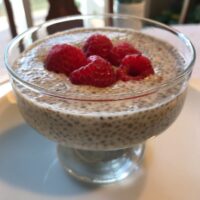No longer limited to ‘the pottery that grows,’ chia seeds add fiber, antioxidant oomph to your diet
(The following article was written for the March 2022 issue of Get Healthy magazine, a publication of The Northwest Indiana Times.)
Chia seeds have been popular since they appeared on a ch-ch-ch-Chia Pet ram in 1982.
To answer your burning question, yes, the seeds are the same as those in health food stores. However, the Chia Pet seeds shouldn’t be eaten because they’re not thoroughly cleaned or approved for consumption by the Food and Drug Administration.
The chia seeds that you add to your diet are FDA approved and available at your local grocery or health food store. They are highly nutritious and add an interesting texture to many foods.
Native to Mexico and Guatemala, chia seeds were a staple for the ancient Aztecs and Mayans. The word “chia” means “strength” in Mayan, indicating the seeds’ power was well known. 
Nutritional value
Chia seeds are considered a superfood, rich in compounds such as antioxidants, fiber or fatty acids considered exceptionally beneficial to a person’s health. An ounce (2 tablespoons) of these seeds, provides 10 grams of fiber, 4 grams of protein and a large amount of anti-inflammatory omega-3 fatty acids. The seeds offer all nine essential amino acids, available only from dietary sources and essential to life. Their most abundant minerals are magnesium, calcium, copper, phosphorous, manganese and selenium.
Health benefits
The benefits of these tiny seeds include improved blood sugar control, increased levels of omega-3 fatty acids, increased weight loss, enhanced regularity, better digestion, stronger bones, enhanced oral health, improved energy and exercise performance, glowing skin, improved heart health and lower blood pressure.
How to eat them
When you go to purchase chia seeds, you may see that you have the option of choosing black or white seeds. Any nutritional differences are marginal, so make your choice based on aesthetics. You may even find a mixture of the two. But pass on an obvious number of brown seeds. Though they aren’t harmful to eat, they are either immature and lack optimal nutrition or are some form of weed seed. Choose organically grown when possible and be sure to check the expiration date. They are naturally gluten-free.
Since chia seeds are mild in taste, they’ll take on the flavor of other recipe ingredients. Soaking them in water before adding them to your food gets rid of the protective layer around the shell, which the body can have trouble breaking down. Soaking creates a gel like substance, makes them easier to digest and allows you to get the most nutrients and benefits. Ground chia seeds don’t have the protective layer, so no need to soak.
Depending on how you plan to use them, you can soak 2 tablespoons of seeds in a cup of water, milk or milk alternative for at least 30 minutes; two hours to overnight is ideal.
Add the soaked seeds:
*To smoothies, Greek yogurt, oatmeal or other hot or cold cereals and salads. The longer they soak, the more liquid they absorb and the thicker your final product.
*To soup to thicken it at the end of cooking.
*To homemade jam instead of pectin to thicken it.
*To baked goods as a substitute for eggs. Combine 1 tablespoon chia seeds and 3 tablespoons water; let sit for 5 minutes. This mixture replaces one egg in your baked goods.
*To salad dressings, sauces, marinades or cake/muffin/bread batter.
*To tea, juice or water to help you stay hydrated longer.
*To other grains — mix one tablespoon of seeds with a cup of other grains such as rice or quinoa. Ground chia seeds can be combined with your favorite coating for meat, chicken or fish or used in place of it.
Chia pudding variations make a great breakfast, snack or dessert. Make homemade breakfast or protein bars.
Special concerns
Since chia seeds are high in fiber, incorporate them into your diet slowly to prevent digestive issues such as bloating and gas. Soaking them and staying well hydrated will help guard against unpleasant effects.
It is not advisable to eat dry chia seeds by themselves. Since they absorb 10-12 times their weight in liquid, they can easily swell and become lodged in the throat. This is of special concern with people who have problems swallowing. Large doses of omega-3 fats, such as those from fish oils, may have blood-thinning effects. Since chia seeds contain omega-3 fatty acids, you may want to check with your doctor if you’re on blood thinning medications and plan to eat large amounts of chia seeds.
Consumed in moderation, most people experience no negative effects from chia seeds. One to three tablespoons per day is the typical recommendation.


